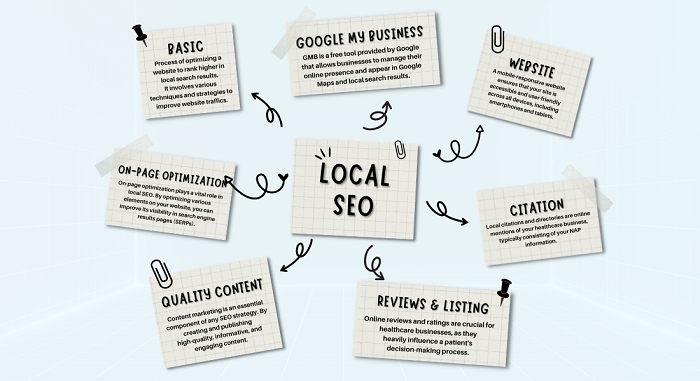In today’s digital age, having a strong online presence is crucial for businesses, including healthcare providers. With the increasing reliance on search engines to find local services, implementing effective local SEO (Search Engine Optimization) strategies is essential for healthcare businesses to attract new patients and stay ahead of the competition. This article will guide you through the process of optimizing your healthcare business for local search results, ensuring that you reach the right audience and maximize your online visibility.
Table of Contents
- Introduction
- Understanding Local SEO
- Claiming and Optimizing Your Google My Business Listing
- Building a Mobile-Friendly Website
- Implementing On-Page Optimization Techniques
- Creating High-Quality Content
- Acquiring Online Reviews and Ratings
- Leveraging Local Citations and Directories
- Utilizing Social Media for Local Engagement
- Local Link-Building Strategies
- Monitoring and Analyzing Your Local SEO Efforts
- Keeping Up with Algorithm Updates
- Hiring an SEO Professional
- Measuring Success: Key Metrics to Track
- Conclusion
- FAQs
1. Introduction
In this digital era, people often turn to search engines like Google when they need to find local healthcare services. Therefore, it’s crucial healthcare businesses optimize their online presence and improve their local search visibility. By implementing effective local SEO strategies, healthcare providers can ensure that their services are visible to potential patients in their target area.

2. Understanding Local SEO
Local SEO is the process of optimizing a website to rank higher in local search results. It involves various techniques and strategies to improve online visibility, increase website traffic, and attract more local customers. By targeting specific geographical locations, healthcare businesses can reach their target audience effectively.
3. Claiming and Optimizing Your Google My Business Listing
One of the most critical steps in local SEO for healthcare businesses is claiming and optimizing your Google My Business (GMB) listing. GMB is a free tool provided by Google that allows businesses to manage their online presence and appear in Google Maps and local search results. By claiming your GMB listing and providing accurate and up-to-date information about your healthcare practice, you increase the chances of appearing in local search results.
To optimize your GMB listing:
- Ensure that your business name, address, and phone number (NAP) are consistent across all online platforms.
- Choose the correct categories that best describe your healthcare services.
- Add a compelling business description and highlight your unique value proposition.
- Upload high-quality photos that showcase your facility, staff, and services.
- Encourage patients to leave reviews on your GMB listing.
4. Building a Mobile-Friendly Website
With the increasing use of smartphones, having a mobile-friendly website is crucial for healthcare businesses. A mobile-responsive website ensures that your site is accessible and user-friendly across all devices, including smartphones and tablets. It improves the overall user experience and increases the chances of ranking higher in mobile search results.
When building a mobile-friendly website:
- Use a responsive web design that adjusts to different screen sizes automatically.
- Optimize your website’s loading speed to provide a seamless experience for mobile users.
- Ensure that your website is easy to navigate, with clear and intuitive menus.
- Optimize your website’s content and images for mobile viewing.
5. Implementing On-Page Optimization Techniques
On-page optimization plays a vital role in local SEO. By optimizing various elements on your website, you can improve its visibility in search engine results pages (SERPs). Some essential on-page optimization techniques for healthcare businesses include:
- Conducting keyword research and incorporating relevant keywords into your website’s content.
- Optimizing title tags, meta descriptions, and header tags with local keywords.
- Using structured data markup to provide search engines with additional information about your healthcare practice.
- Optimizing your website’s URL structure to include relevant keywords.
6. Creating High-Quality Content
Content marketing is an essential component of any SEO strategy. By creating and publishing high-quality, informative, and engaging content, healthcare businesses can attract and educate their target audience. When creating content for local SEO:
- Focus on topics relevant to your healthcare specialty and target audience.
- Incorporate local keywords naturally throughout your content.
- Include a mix of written content, images, videos, and infographics to cater to different user preferences.
- Regularly update your website’s content with fresh and relevant information.
7. Acquiring Online Reviews and Ratings
Online reviews and ratings are crucial for healthcare businesses, as they heavily influence a patient’s decision-making process. Positive reviews not only improve your online reputation but also help in local SEO by signaling trust and credibility to search engines. Encourage satisfied patients to leave reviews on platforms such as Google, Yelp, and Healthgrades.
To acquire online reviews:
- Ask patients for feedback after their visit and provide them with easy-to-follow instructions on leaving reviews.
- Monitor and respond to reviews promptly, both positive and negative.
- Use patient testimonials on your website to showcase the positive experiences of your patients.
8. Leveraging Local Citations and Directories
Local citations and directories are online mentions of your healthcare business, typically consisting of your NAP information. These citations help search engines validate your business’s location and relevance to a specific area. Ensure that your NAP information is consistent across various online directories, including healthcare-specific directories like WebMD and Zocdoc.
To leverage local citations:
- Claim your listings on relevant local directories and update your NAP information.
- Include complete and accurate information, such as your business hours, website URL, and services offered.
- Remove any duplicate or incorrect listings that may confuse search engines.
9. Utilizing Social Media for Local Engagement
Social media platforms provide an excellent opportunity for healthcare businesses to engage with their local audience and build brand awareness. By creating and maintaining active social media profiles, you can share valuable healthcare information, interact with patients, and promote your services. Some tips for utilizing social media for local engagement:
- Identify the social media platforms most popular among your target audience.
- Share informative and engaging content related to your healthcare specialty.
- Interact with your followers and respond to comments and messages promptly.
- Promote your local events, community involvement, and patient success stories.
10. Local Link Building Strategies
Link building is an important aspect of SEO. By acquiring high-quality backlinks from reputable websites, you can improve your website’s authority and search engine rankings. When implementing local link-building strategies for your healthcare business:
- Reach out to local organizations, charities, or healthcare associations for potential collaboration opportunities.
- Sponsor local events and request acknowledgment on their websites.
- Seek partnerships with local influencers or bloggers who can mention your healthcare practice in their content.
- Create valuable and shareable content that others in the healthcare industry would want to link to.
11. Monitoring and Analyzing Your Local SEO Efforts
To ensure the effectiveness of your local SEO strategies, it’s crucial to monitor and analyze your efforts regularly. By using analytics tools and tracking key metrics, you can identify areas for improvement and make data-driven decisions. Some essential metrics to track for local SEO include:
- Organic website traffic from local search results.
- Keyword rankings for local search terms.
- Conversion rates for local visitors.
- Online reviews and ratings.
12. Keeping Up with Algorithm Updates
Search engine algorithms constantly evolve, and staying updated with the latest changes is essential for maintaining your local search rankings. Subscribe to reputable SEO blogs, follow industry experts, and stay informed about any algorithm updates or changes in local SEO best practices. Regularly review and adjust your strategies to align with current guidelines.
13. Hiring an SEO Professional
Implementing and managing local SEO strategies can be time-consuming and complex. If you lack the expertise or resources, consider hiring an SEO professional with experience in local SEO for healthcare businesses. An SEO expert can help develop a customized strategy, optimize your website, and track the results of your local SEO efforts.
14. Measuring Success: Key Metrics to Track
To determine the success of your local SEO campaign, track and analyze key metrics regularly. Some important metrics to consider include:
- Increase in organic website traffic from local searches.
- Higher rankings for local keywords.
- Growth in online reviews and ratings.
- Increase in website conversions from local visitors.
- Improvement in local search visibility and local pack rankings.
15. Conclusion
Implementing effective local SEO strategies is vital for healthcare businesses to thrive in today’s competitive digital landscape. By optimizing your online presence, providing valuable content, and engaging with your local audience, you can attract more patients, build trust, and grow your healthcare practice. Remember to stay updated with the latest trends and adapt your strategies accordingly to stay ahead of the competition.
Introducing WESFED’s Local SEO Services for Healthcare Businesses
Are you a healthcare business looking to optimize your online presence and attract more local patients? WESFED is here to help you achieve success with our specialized local SEO (Search Engine Optimization) services. By optimizing your website, improving search visibility, and targeting local keywords, we can help you attract new patients, increase website traffic, and establish trust in your community. Contact us today to learn more about how we can elevate your local SEO efforts and drive tangible results for your business. Let’s take your healthcare practice to new heights together!
FAQs
1. What is local SEO for healthcare businesses? Local SEO for healthcare businesses is the process of optimizing a healthcare provider’s online presence to rank higher in local search results. It involves implementing various strategies to improve visibility among local audiences and attract new patients.
2. How can I optimize my Google My Business listing? To optimize your Google My Business listing, ensure that your business information is accurate and up-to-date, choose relevant categories, add a compelling description, upload high-quality photos, and encourage patients to leave reviews.
3. Why are online reviews important for healthcare businesses? Online reviews are important for healthcare businesses as they influence a patient’s decision-making process. Positive reviews build trust and credibility, improve your online reputation, and increase the chances of attracting new patients.
4. How can social media help in local engagement for healthcare businesses? Social media platforms provide an opportunity for healthcare businesses to engage with their local audience, share valuable healthcare information, interact with patients, and promote services. It helps in building brand awareness and establishing a connection with the community.
5. How can I measure the success of my local SEO efforts? To measure the success of your local SEO efforts, track metrics such as organic website traffic from local searches, keyword rankings for local terms, online reviews and ratings, website conversions from local visitors, and improvements in local search visibility and rankings.

